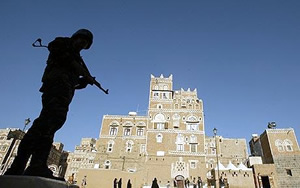With the world’s eyes and media focused on the crisis in Ukraine, the people of Yemen cannot afford to be ignored - now more than ever.

For almost eight years, the small country of Yemen on the Arabian Peninsula, has been victim of devastating civilian suffering under an intractable civil war.
Due to widespread hunger, disease and attacks on civilians, the United Nations’ has described the situation in Yemen as the world’s worse humanitarian crisis.
Warnings have been made that the Ukraine conflict could hit food supplies and worsen the hunger crisis in Yemen.
Devastating hunger could worsen
The World Food Program (WFP) warned this week that the Russia/Ukraine conflict is likely to increase fuel and food prices in import-dependent Yemen, where, during the past year, the cost of food has doubled in many areas.
The threat to wheat supplies from Russia’s invasion of Ukraine has raised concerns that Yemen’s hunger crisis could deepen.
As Reuters reports, in response to potential disruption of global wheat supplies, some Yemenis have been rushing to buy flour.
“People are now rushing to purchase, people are on alert, anticipating a crisis. They are taking, ten, twenty sacks,” said wholesaler Mohammed al-Nimri in Yemen’s capital Sanaa.
Shortfall in aid funding
Concerns about diminishing wheat supplies exacerbating Yemen’s hunger crisis, come amid in a shortfall in aid funding to the war-torn country.
Yemen has been involved in almost eight years of conflict between the internationally-recognised government – supported by a Saudi-led military coalition – and Houth rebels backed by Iran.
The World Food Program (WFP) has said it has been “forced” to cut aid to Yemen because of lack of funding. In December 2021, the WFP warned there would be a surge in hunger in the war-torn country in coming months.
Now, as the crisis in Ukraine escalates, the situation in Yemen looks even bleaker.
In a statement issued on February 24, WFP executive director David Beasley said: “We have no choice but to take food from the hungry to feed the starving and, unless we receive immediate funding, in a few weeks we risk not even being able to feed the starving.”
UK cuts foreign funding
In July 2021, the UK government held a vote on the future of foreign aid and development. The majority of MPs voted to allow for an indefinite reduction of the UK’s overseas aid budget until a number of economic tests are met, rather than return to spending 0.7% of the country’s Gross National Income.
In response to the decision to approve a £4bn foreign aid cut, reports emerged that places in conflict zones like Yemen had begun witnessing the devastating impact of the cuts to overseas assistance, condemning hundreds of thousands to starvation.
‘Double standards’
Now, in the wake of the conflict in Ukraine, the UK has been accused of ‘double standards’ by rushing to help Ukraine against a foreign invader, while cutting aid to Yemen.
Britain’s implications with supplying the Saudi regime with weapons has also resurfaced following Russia’s invasion of Ukraine.
In June 2020, the UN reported more than 60% of civilian deaths in Yemen had been the result of Saudi-led airstrikes. Since the bombing of Yemen began in 2015, the UK has licensed at least £5.4 billion worth of weapons to the Saudi regime.
The UK government’s involvement in the supply of weapons to Saudi has been raised this week.
“Bombing innocent civilians is a war crime” says Boris Johnson, as UK-supplied bombs dropped by UK-supported Saudi forces rain down on innocent civilians in Yemen,” someone tweeted.
Amid heightened conflict and with the hunger crisis set to escalate because of the war in Ukraine, projects like the Emergency Crisis Response Project (ECRP), which is implemented on the ground by two Yemeni institutions, the Public Works Project (PWP) and the Social Fund for Development (SFD), in partnership with the United Nations Development Programme (UNDP) and the United Nations Children’s Fund (UNICEF), which works towards aiding recovery and resilience in Yemen, will be more critical than ever.
Gabrielle Pickard-Whitehead is a contributing editor to Left Foot Forward
Left Foot Forward doesn't have the backing of big business or billionaires. We rely on the kind and generous support of ordinary people like you.
You can support hard-hitting journalism that holds the right to account, provides a forum for debate among progressives, and covers the stories the rest of the media ignore. Donate today.



